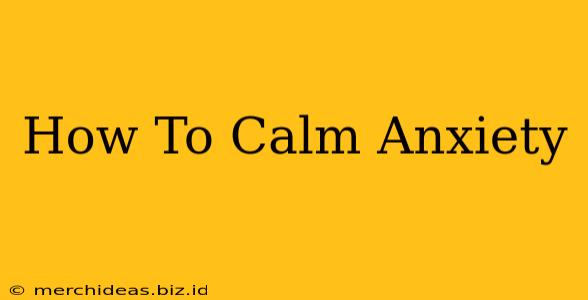Anxiety. That nagging feeling of unease, that knot in your stomach, the racing thoughts that keep you up at night. It's something millions experience, and while it's a normal human emotion, unmanaged anxiety can significantly impact your daily life. This guide explores practical, effective techniques to help you calm anxiety and regain control.
Understanding Your Anxiety Triggers
Before diving into coping mechanisms, it's crucial to understand what triggers your anxiety. Keeping a journal can be incredibly helpful. Note down situations, thoughts, or feelings that precede anxious episodes. Identifying these triggers allows you to proactively address them. Common triggers include:
- Stressful events: Work deadlines, relationship problems, financial worries.
- Social situations: Public speaking, meeting new people, large gatherings.
- Physical factors: Lack of sleep, poor diet, excessive caffeine.
- Underlying health conditions: Certain medical conditions can exacerbate anxiety.
Simple Techniques to Calm Anxiety Immediately
When anxiety strikes, you need immediate relief. These techniques can help you manage those intense moments:
1. Deep Breathing Exercises:
This is arguably the most effective immediate anxiety reliever. Try the 4-7-8 technique:
- Inhale deeply through your nose for a count of 4.
- Hold your breath for a count of 7.
- Exhale slowly through your mouth for a count of 8.
- Repeat several times.
This technique slows your heart rate and calms your nervous system.
2. Progressive Muscle Relaxation:
This technique involves systematically tensing and releasing different muscle groups in your body. Starting with your toes and working your way up, tense each muscle group for a few seconds, then release, noticing the difference in tension. This helps release physical tension often associated with anxiety.
3. Mindfulness and Meditation:
Focusing on the present moment can help break the cycle of anxious thoughts. Mindfulness exercises, even for a few minutes, can bring a sense of calm. There are numerous guided meditations available online or through apps.
4. Grounding Techniques:
Grounding techniques help bring you back to the present when anxiety feels overwhelming. Try these:
- 5-4-3-2-1 method: Name 5 things you can see, 4 things you can touch, 3 things you can hear, 2 things you can smell, and 1 thing you can taste.
- Focus on your senses: Pay close attention to the details of your surroundings – the texture of your clothes, the temperature of the air, sounds around you.
Long-Term Strategies for Managing Anxiety
While immediate relief is essential, long-term strategies are crucial for sustained anxiety management.
1. Regular Exercise:
Physical activity releases endorphins, which have mood-boosting effects. Aim for at least 30 minutes of moderate-intensity exercise most days of the week.
2. Healthy Diet:
Nourishing your body with a balanced diet can significantly impact your mental well-being. Limit processed foods, sugar, and caffeine, and focus on whole grains, fruits, and vegetables.
3. Sufficient Sleep:
Aim for 7-9 hours of quality sleep each night. Establish a regular sleep schedule and create a relaxing bedtime routine.
4. Cognitive Behavioral Therapy (CBT):
CBT is a type of therapy that helps you identify and challenge negative thought patterns contributing to anxiety. A therapist can guide you through techniques to reframe your thinking and develop coping strategies.
5. Seek Professional Help:
If your anxiety is significantly impacting your life, don't hesitate to seek professional help. A therapist or doctor can provide a proper diagnosis and recommend appropriate treatment options, including medication if necessary.
Conclusion: Taking Control of Your Anxiety
Managing anxiety is a journey, not a destination. By understanding your triggers, utilizing immediate coping mechanisms, and implementing long-term strategies, you can significantly reduce the impact of anxiety on your life. Remember, you're not alone, and help is available. Take that first step towards a calmer, more fulfilling life.
